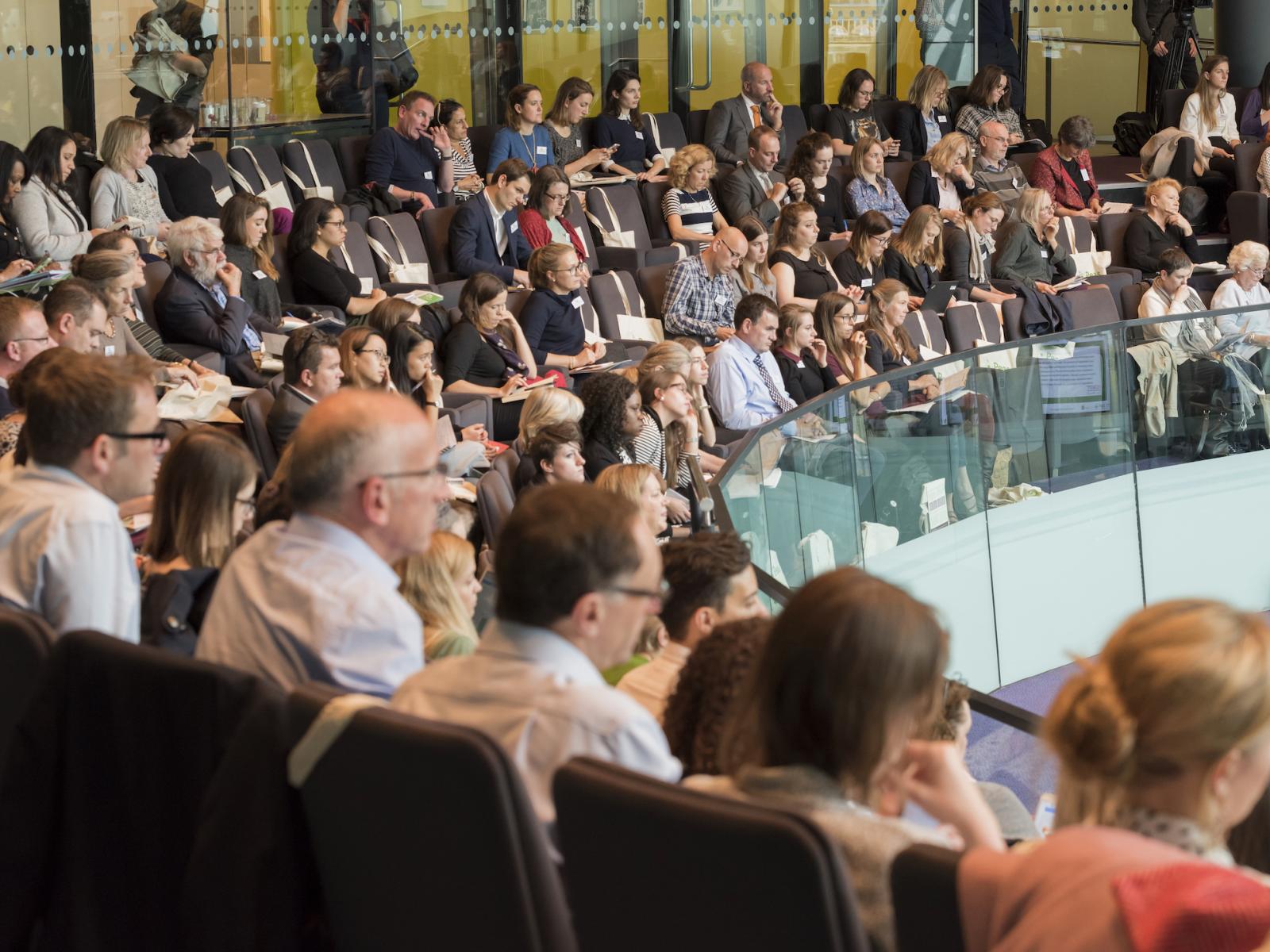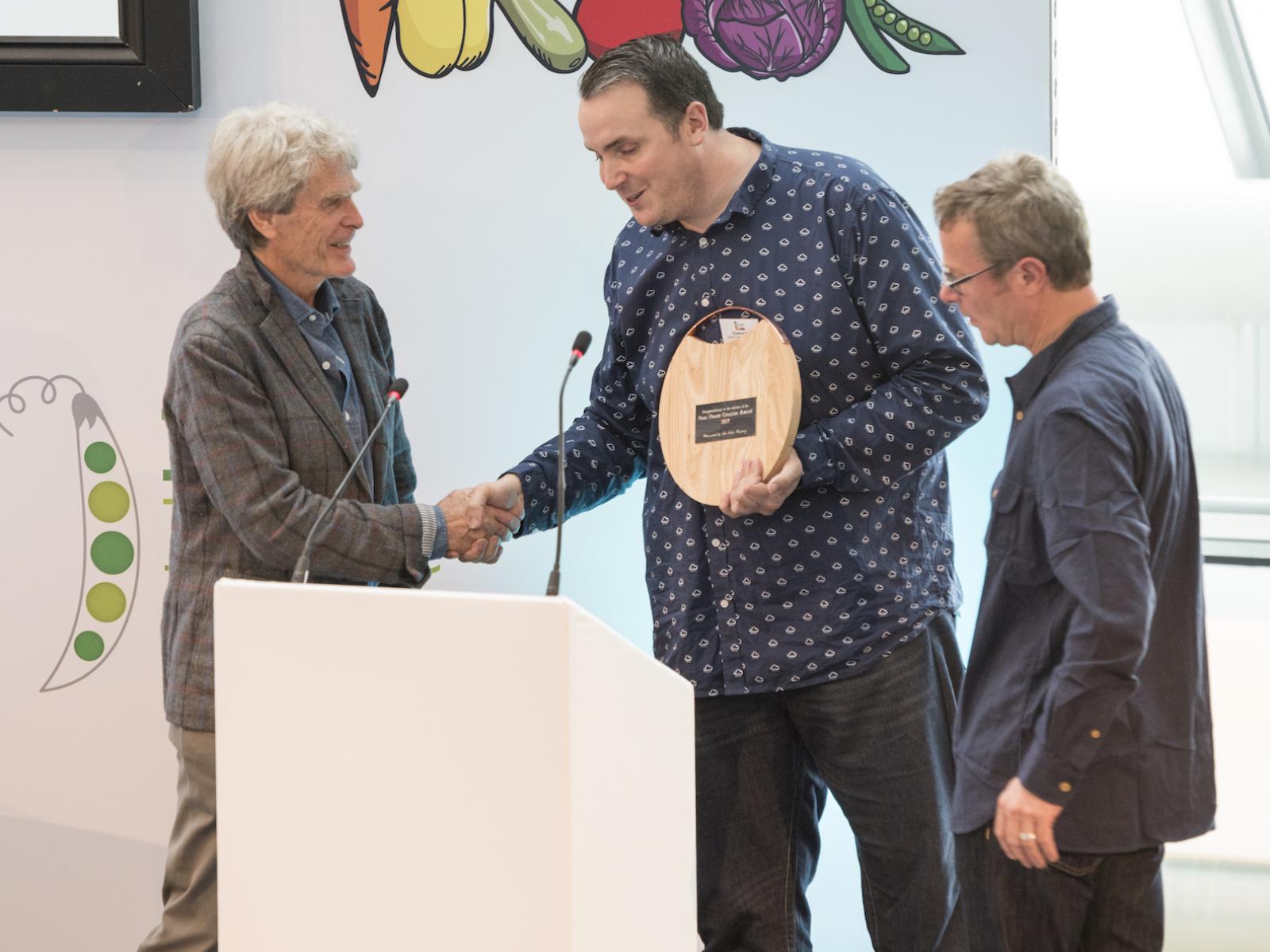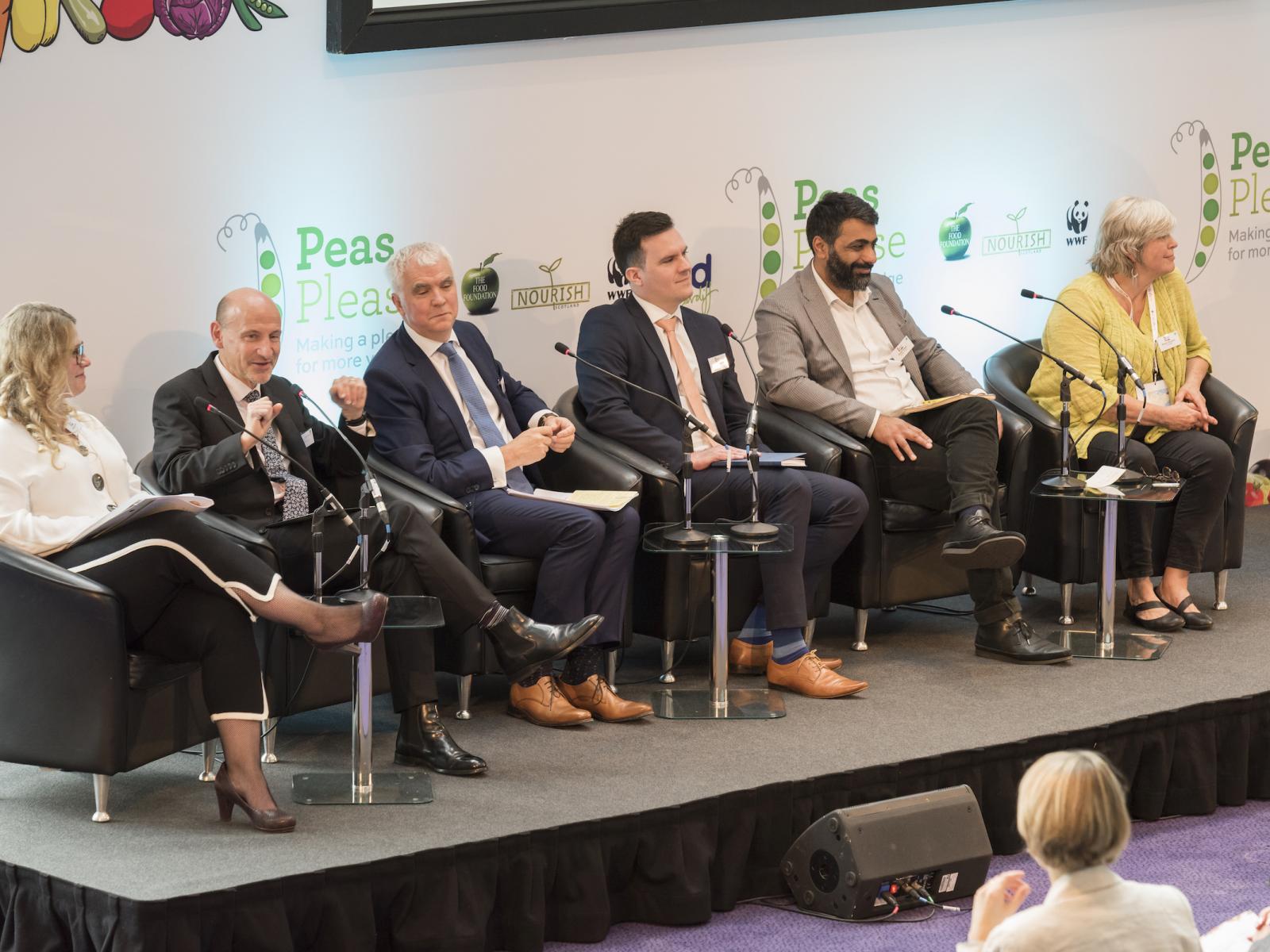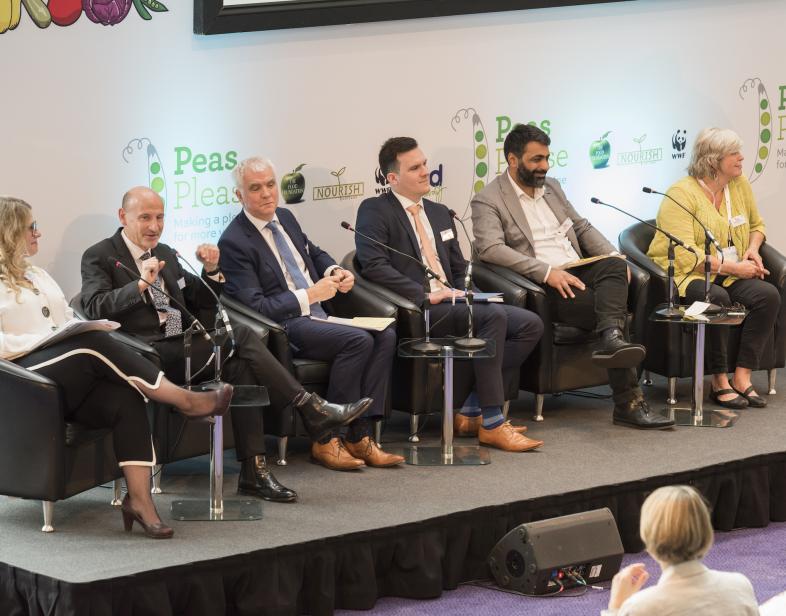An Overview Of Our Solution
Peas Please is a food systems approach to driving up consumption of veg in the UK. It deals with low levels of vegetable consumption which are linked to poor health and unsustainable diets. At its heart is the evidence which shows that while people know they should be eating more veg, they struggle to do so, because the food system currently makes it too difficult. We’re trying to shift the food system in favour of eating more veg by galvanising businesses and policy makers to shift policy and practice to help us eat more vegetables. Peas Please, which is a collaboration between The Food Foundation, Nourish Scotland, WWF-UK and Food Cardiff, has been running for 2 years; we have achieved a huge amount in this short period and the initiative is already delivering impact.
- Population Impacted: TBA October 2018
- Continent: Europe
Last name
Organization type
Context Analysis
Our research has found that vegetable consumption has been declining in the UK and we are eating no more than in the 1970’s despite the government's 5-A-Day information campaign. We should be eating 3.5 portions of veg a day but almost no-one eats this much. A quarter of teenagers are eating less than 1 portion a day. Poor people in Britain eat about half a portion less than the rich.
Current food systems are also environmentally unsustainable. The production, distribution and consumption of food generates about one third of global GHG emissions. The rearing of animals for meat consumption accounts for about 15% of all global GHG emissions (i.e. half of food related emissions) and utilises about three quarters of all agricultural land contributing to significant bio-diversity loss.
In the UK, if we ate one more portion of veg a day and a little less meat we could reduce UK diet-related greenhouse gas emissions by 17% and prevent 20,000 premature deaths.
Describe the technical solution you wanted the target audience to adopt
Peas Please brings together farmers, retailers, fast food and restaurant chains, caterers, processors and government departments with a common goal of making it easier for everyone to eat more vegetables. Together we are improving the availability, convenience, affordability and quality of vegetables and vegetable-based options across the food system.
The initiative is centred around “The 5 Ps”…
- Pleasure: making our veg delicious whenever we eat it
- Producers: growing veg sustainably at all different scales
- Price: making veg affordable but at a price that works equally for producers and consumers
- Products: new ways of getting veg into what we buy and eat everyday
- Placement: more prominence in shops, on menus and more places to buy veg in towns and cities
The specific actions we are asking food system actors to adopt are captured in our ten point commitments framework (https://foodfoundation.org.uk/wp-content/uploads/2018/06/Commitments-fr…).
Type of intervention
Describe your behavioral intervention
Peas Please is focused on making it easier for people to shift towards a diet which contains more vegetables by changing the food system itself. However, in addition to working upstream on systemic change within the food system we are also aware that unless the image of vegetables is improved, demand will not necessarily follow supply. In the UK only 1.2% of food and drink advertising spend goes on vegetables so we have also crowd-funded to create an advertising fund for vegetables (see crowd funder video: https://www.crowdfunder.co.uk/vegpower) to harness the power of advertising and shift our attitudes to vegetables.
The purpose of the Veg Power advertising fund is to make veg desirable to those who don’t eat enough using a wide range of marketing techniques across multiple channels. We have secured contributions to the fund from major supermarket chains, producers, manufacturers, celebrities, charities and the general public and have raised £120,000. Our crowdfunding campaign reached more than 10 million people in the UK on social media. We are now moving into designing the proof of concept stage which will test a number of creative marketing strategies among specific geographies and target groups, as well as carefully monitor impact and develop a long financing plan for the Fund.
As needed, please explain the type of intervention in more detail
We worked through a series of 10 workshops with more than 150 organisations to develop our Ten Point Commitments framework. Since then, we have worked to influence more than 40 businesses and local authorities to make pledges in line with the commitments framework. These businesses include supermarket retailers which have a combined market share of 54% of the grocery market in the UK; Greggs sandwich chain which has 1850 shops across the UK; Sodexo contract caterers which serve an estimated 1 million meals per day; and Birmingham city council – the largest local authority in Western Europe.
Describe your implementation
We have established a Peas Please strategy board which includes Prof Martin White from the University of Cambridge, PWC, WRAP and others who have worked with us to develop a state of the art monitoring system to track the work of our pledgers. We rolled out this system for the first time in June this year and are now collating the data on the impact and have developed metrics which allow us to track overall progress of Peas Please. We have also developed a series of case studies which explain what our pledgers have learned through the course of their pledge implementation and the barriers and opportunities they have faced. These will all be published in our annual progress report which will launched on October 8, 2018 in London at the next Vegetable Summit.
We have also developed a range of approaches to maintain the engagement of our pledgers. These include a pledgers learning event which we held in Birmingham in March 2018 where pledgers had the chance to learn from each other. We have also developed a retailer toolkit and food services compendium to help inspire businesses to take evidence based action to make it easier for their customers to eat veg.
The main challenges have been engaging the high street restaurant chains who are facing a particularly competitive environment currently and operating in a mature market. Combined with the effects of Brexit on the economy and the cost of food and labour, this makes it difficult for these businesses to engage with Peas Please. To address this we are working on a business case for these companies to help make a stronger case for their involvement.
External connections
To date, 40+ businesses & organisations have pledged, including retail, out-of-home food providers, manufacturers, food producers & member organisations, government/local authorities, third sector organisations, and education. The full list of pledgers is here: https://foodfoundation.org.uk/veg-pledges/
Veg Power has engaged many beyond our pledgers, including celebrity chefs Jamie Oliver, Hugh Fearnley Whittingstall and Michel Roux Jnr, Sir Paul McCartney and many others.
The Peas Please team also works with central and devolved governments to ensure a supportive policy environment. We formed of an industry-led Fruit and Vegetable Alliance to lobby government on support for horticulture in the UK’s new Agriculture Bill. Our partners Nourish Scotland helped to secure a national task force working on fruit and vegetables in Scotland.
Through Peas Please, we also have increasing policy influence. The Scottish Government is currently consulting on revising school meal regulations to stipulate including 2 portions of veg in every meal. The UK Government recently launched the second chapter of the Childhood Obesity Strategy, including more support for a voucher scheme that low-income families can use to buy vegetables. Both of these are in line with the Peas Please framework.
Who adopted the desired behaviors and to what degree?
We received pledges & commitments from 40+ businesses, organisations & local authorities. We’re currently in the process of monitoring progress implementation over the first 8 months, and the data will be released in October 2018. The first year progress report will show the majority of pledgers have made progress and many are on-track to meet their pledge or have already done so. We will also report on the collective impact of the initiative including millions of additional portions of veg sold and thousands of people reached. Pledge examples include Greggs who’ve committed to sell an additional 15 million portions of veg by 2020 and Sodexo (who supply over 1m meals a day) increasing veg in its meals by 10%.
How did you impact natural resource use and greenhouse gas emissions?
Peas Please is increasing vegetable consumption to benefit people’s health and our environment. By increasing plant-based food, Peas Please will consequently decrease meat consumption and its negative environmental consequences. In the UK meat accounts for 48% of the UK’s dietary emissions. Eating an extra portion of veg and eating a little less meat would reduce the UK’s diet-related greenhouse gas emissions by 17%. Several of our pledgers committed to shift their food offer towards more plant-based dishes and they are also tracking impacts on their carbon emissions (e.g. Baxter Storey/PWC and Sodexo) but we don’t yet have this data yet.
Vegetable consumption and production is declining in the UK and we are becoming more reliant on imported vegetables. One aim of Peas Please is to increase domestic production and consumption of veg, which if done sustainably would help offset environmental consequences from fruit and veg production in other countries and transporting it to the UK.
What were some of the resulting co-benefits?
Eating more vegetables delivers a range of co-benefits. When vegetables replace meat, unhealthy snacks or refined carbohydrates the overall diet shifts to being more healthy and environmentally sustainable. In and of themselves vegetables deliver a range of protective health qualities and are directly associated with reduced risk of cancer, heart disease, stroke and type 2 diabetes. But also eating more vegetables particularly when they are grown using more agro-ecological processes can help with reducing the carbon footprint of our diets and of our agricultural production. We have tried within Peas Please to engage both large and small producers. Many of the latter group are delivering a range of environmental benefits as well as social benefits by bringing people closer to the origins of their food and helping to deliver vegetables with reduced packaging and greater variety.
Sustainability
Central set up/delivery costs are currently met by funding from Food Foundation core funders (Nuffield/Esmée Fairbairn Foundations) and those of our 3 main partners (World Wildlife Fund UK/Nourish Scotland/Food Cardiff), with Food Foundation staff time being the largest cost. We’re currently in discussion with a major grant funder to secure a development grant for a business planning process for Peas Please, which we expect to lead to securing a further 3-year funding grant for core costs. However, we do not expect Peas Please to be overly dependent on grant funding; momentum is gathering with more and more interest from government, companies and organisations who are increasingly prepared to invest time and significant resources.
Return on investment
Overall, the set up & delivery of Peas Please to June 2018 has cost in the region of £150,000 made up mostly of staff time, events, communications. This total only includes costs managed by the Food Foundation, so does not include the costs of our partner organisations nor each Pledger in collaborating with the partnership and implementing their commitments.
Peas Please is a unique partnership initiative, so we have no equivalent programme against which to benchmark cost & ROI. However, given our achievements in such a short space of time and that a partnership infrastructure is now in place, we’re confident that Peas Please represents excellent value, which will only increase as it scales up and more partners join the initiative.
How could we successfully replicate this solution elsewhere?
To our knowledge, an initiative like Peas Please is unique, but we believe it is easily replicable. Effective partnership working has been key to our success, and we would be very willing to share our story and lessons learned with international partners to replicate the initiative. The UK has considerable untapped potential which, with additional resources, Peas Please could exploit. However, it is crucial that business pledges are matched by a supportive regulatory framework. The scale of the challenge is immense and to deliver the change needed much greater resources would need to be mobilised.
Peas Please has also spurred action beyond our direct Pledgers, e.g. a school launched a Peas Please curriculum, and the Dutch GroetenFruit Huis initiative adopted a campaign on the out-of-home sector, in addition to their Peas Please pledge. The United Nations Food and Agriculture Organisation profiled Peas Please in an international guidance document they are producing.




